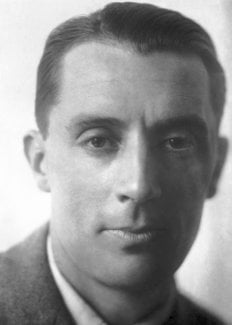Frédéric Joliot
Biographical

Jean Frédéric Joliot, born in Paris, March 19, 1900, was a graduate of the Ecole de Physique et Chimie of the city of Paris. His father was Henri Joliot, a merchant, and his mother was Emilie Roederer. In 1925 he became, at the Radium Institute, assistant to Marie Curie, whose daughter Iréne he married in 1926. He obtained his Doctor of Science degree in 1930, having prepared a thesis on the electrochemistry of radio-elements, and became lecturer in the Paris Faculty of Science in 1935. At this time he carried out considerable research on the structure of the atom, generally in collaboration with his wife, Iréne Joliot-Curie. In particular they worked on the projection of nuclei, which was an essential step in the discovery of the neutron (Chadwick, 1932) and the positron (Anderson, 1932). However, their greatest discovery was artificial radioactivity (1934). By bombardment of boron, aluminium, and magnesium with alpha particles, they produced the isotope 13 of nitrogen, the isotope 30 of phosphorus and, simultaneously, the isotopes 27 of silicon and 28 of aluminium. These elements, not found naturally, decompose spontaneously, with a more or less long period, by emission of positive or negative electrons. It was for this very important discovery that these two physicists received in 1935 the Nobel Prize for Chemistry. During this time F. Joliot, who had always taken an interest in social questions, joined the Socialist Party, the S.F.I.O. (1934), then the League for the Rights of Man (1936)
In 1937 he was nominated Professor at the Collège de France. He left the Radium Institute and had built for his new laboratory of nuclear chemistry the first cyclotron in Western Europe. After the discovery of the fission of the uranium nucleus, he produced a physical roof of the phenomenon; then with Hans Halban and Lev Kowarski, joined by Francis Perrin, he worked on chain reactions and the requirements for the successful construction of an atomic pile using uranium and heavy water; five patents were taken out in 1939 and 1940. On the advance of the German forces (1940), F. Joliot managed to get the documents and materials relating to this work transported to England. During the French occupation he took an active part in the Resistance; he was President of the National Front and formed the French Communist Party. After having been Director of the Centre National de la Recherche Scientifique (1945), he became the first High Commissioner for Atomic Energy (1946); he directed the construction of the first French atomic pile (1948). He was relieved of his duties in 1950 for political reasons. While still retaining the control of his laboratories, F. Joliot-Curie took a considerable part in politics and was elected President of the World Peace Council. On the death of Irene Joliot-Curie, in 1956, he became, while still retaining his professorship at the Collège de France, holder of the Chair of Nuclear Physics which she had held at the Sorbonne.
F. Joliot was a member of the French Academy of Sciences and of the Academy of Medicine. He was also a member of numerous foreign scientific academies and societies, and holder of an honorary doctor’s degree of several universities. He was a Commander of the Legion of Honour. His recreations show him as a man of wide attainments, among which piano playing, landscape painting and reading (particularly Kipling), were predominant.
Joliot devoted the last two years of his life to the inauguration and development of a large centre for nuclear physics at Orsay. He died in Paris in 1958.
Jean Frederic and Irene Joliot-Curie had one daughter, Helene, and one son, Pierre.
This autobiography/biography was written at the time of the award and first published in the book series Les Prix Nobel. It was later edited and republished in Nobel Lectures. To cite this document, always state the source as shown above.
Frédéric Joliot died on August 14, 1958.
Nobel Prizes and laureates
Six prizes were awarded for achievements that have conferred the greatest benefit to humankind. The 14 laureates' work and discoveries range from quantum tunnelling to promoting democratic rights.
See them all presented here.
